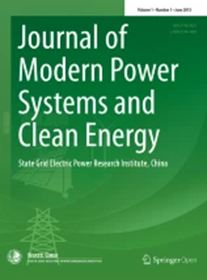Bidding Strategy for Hybrid PV-BESS Plants via Knowledge-Data-Complementary Learning
IF 5.7
1区 工程技术
Q1 ENGINEERING, ELECTRICAL & ELECTRONIC
Journal of Modern Power Systems and Clean Energy
Pub Date : 2024-06-11
DOI:10.35833/MPCE.2024.000279
引用次数: 0
Abstract
The hybrid photovoltaic (PV)-battery energy storage system (BESS) plant (HPP) can gain revenue by performing energy arbitrage in low-carbon power systems. However, multiple operational uncertainties challenge the profitability and reliability of HPP in the day-ahead market. This paper proposes two coherent models to address these challenges. Firstly, a knowledge-driven penalty-based bidding (PBB) model for HPP is established, considering forecast errors of PV generation, market prices, and under-generation penalties. Secondly, a data-driven dynamic error quantification (DEQ) model is used to capture the variational pattern of the distribution of forecast errors. The role of the DEQ model is to guide the knowledge-driven bidding model. Notably, the DEQ model aims at the statistical optimum, but the knowledge-driven PBB model aims at the operational optimum. These two models have independent optimizations based on misaligned objectives. To address this, the knowledge-data-complementary learning (KDCL) framework is proposed to align data-driven performance with knowledge-driven objectives, thereby enhancing the overall performance of the bidding strategy. A tailored algorithm is proposed to solve the bidding strategy. The proposed bidding strategy is validated by using data from the National Renewable Energy Laboratory (NREL) and the New York Independent System Operator (NYISO).求助全文
约1分钟内获得全文
求助全文
来源期刊

Journal of Modern Power Systems and Clean Energy
ENGINEERING, ELECTRICAL & ELECTRONIC-
CiteScore
12.30
自引率
14.30%
发文量
97
审稿时长
13 weeks
期刊介绍:
Journal of Modern Power Systems and Clean Energy (MPCE), commencing from June, 2013, is a newly established, peer-reviewed and quarterly published journal in English. It is the first international power engineering journal originated in mainland China. MPCE publishes original papers, short letters and review articles in the field of modern power systems with focus on smart grid technology and renewable energy integration, etc.
 求助内容:
求助内容: 应助结果提醒方式:
应助结果提醒方式:


